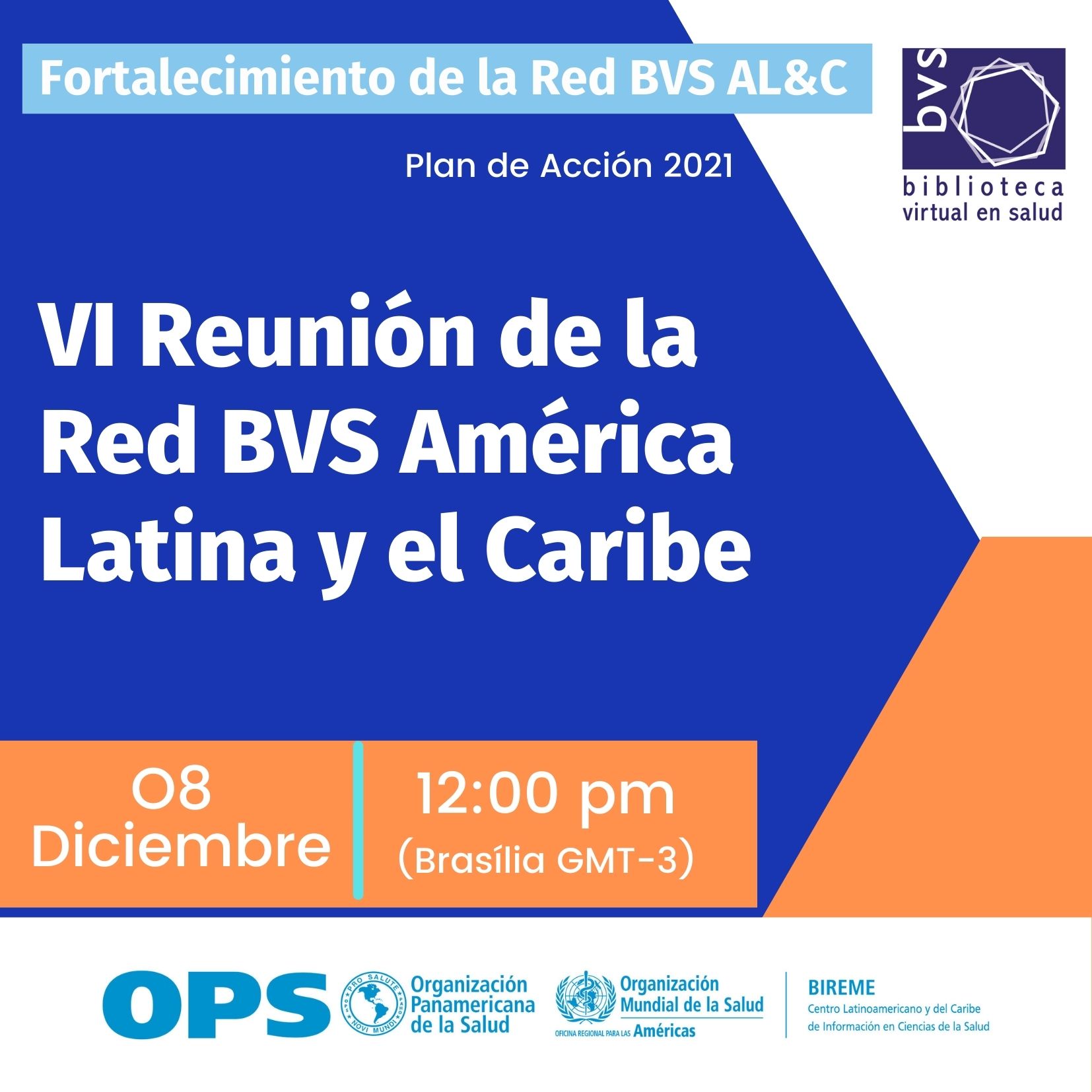
VI Reunión de la Red AL&C: Plan Acción 2021


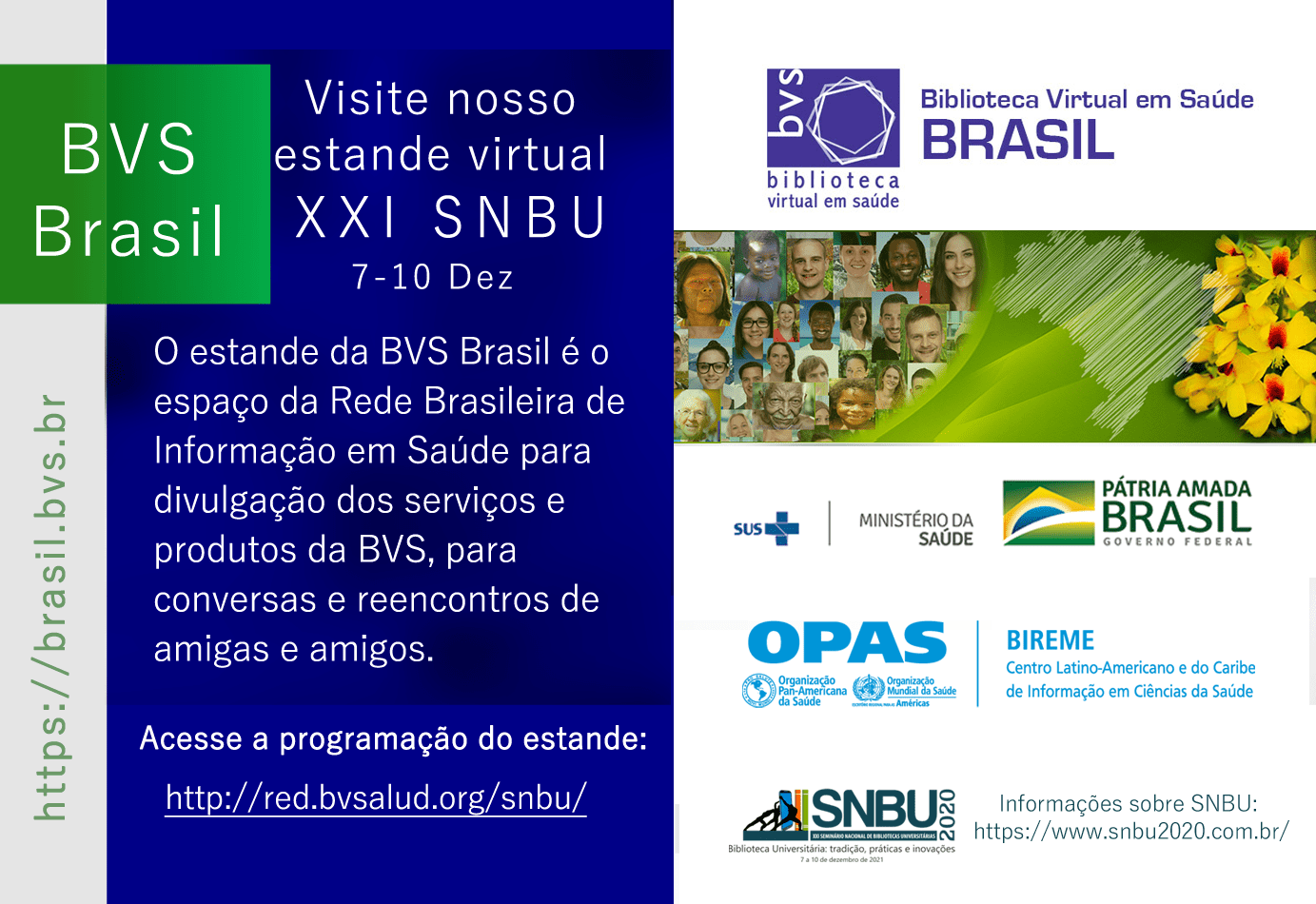
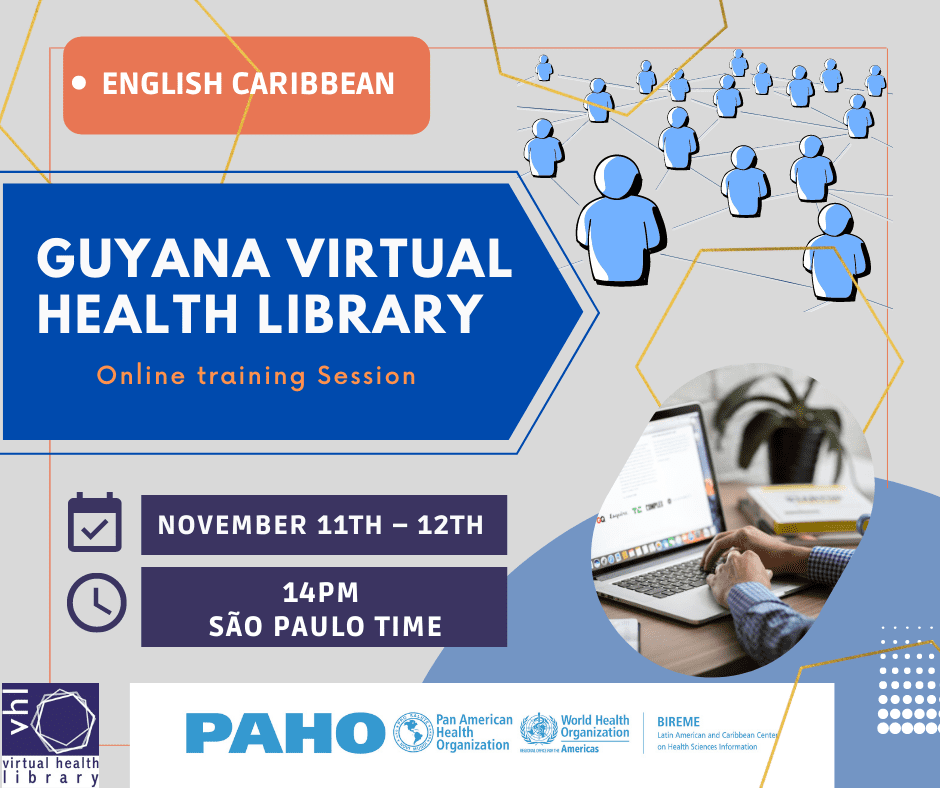
Objective: Training for the Guyana Virtual Health Library.
The specific objectives are:
![]() November 11th-12th 2021.
November 11th-12th 2021.
![]() 2pm-4pm (Sao Paulo time).
2pm-4pm (Sao Paulo time).
![]() https://bit.ly/workshop-VHL-GUY
https://bit.ly/workshop-VHL-GUY
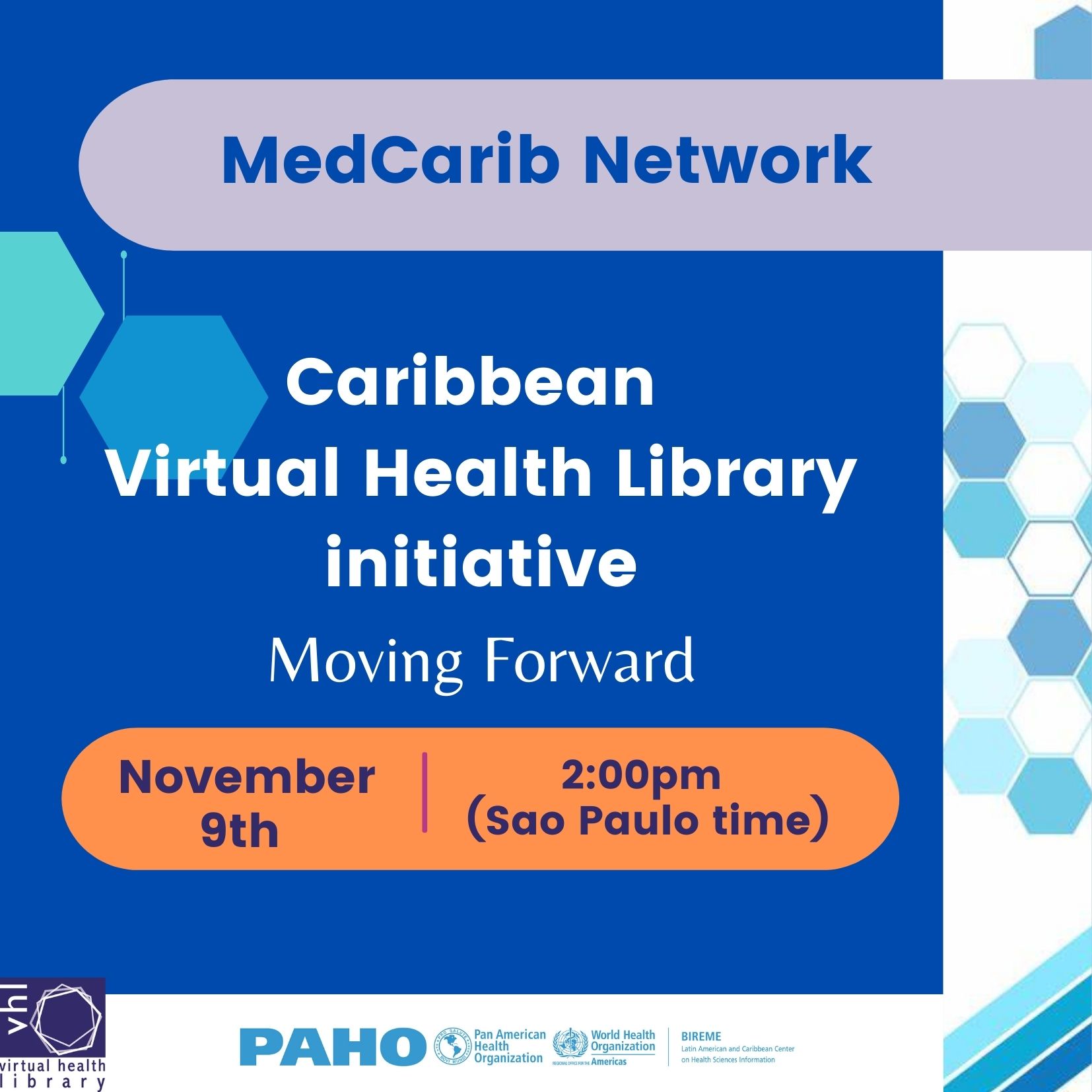
Objective: Meeting with MedCarib network to discuss Caribbean Virtual Health Library initiative and next steps to implement.
![]() November 9th, 2021.
November 9th, 2021.
![]() 2pm-4pm (Sao Paulo time).
2pm-4pm (Sao Paulo time).
![]() Agenda: https://bit.ly/304kDEv.
Agenda: https://bit.ly/304kDEv.
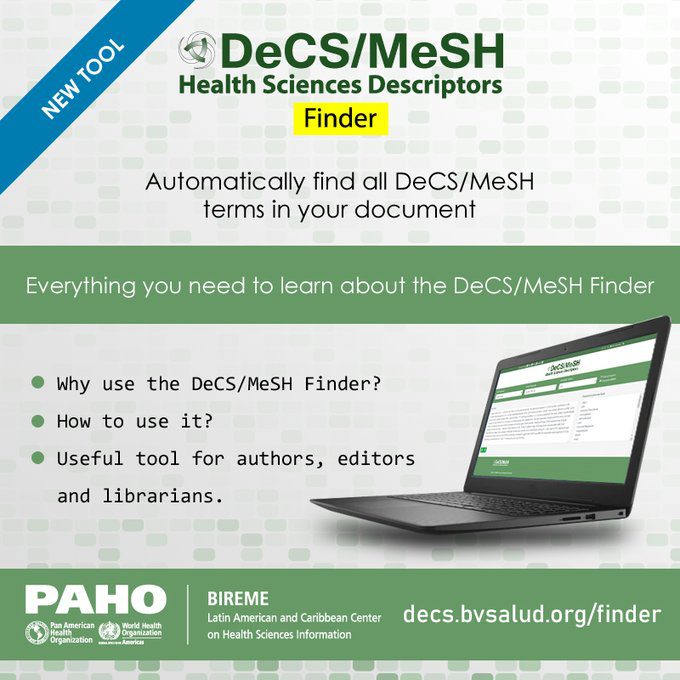
Determining the keywords that briefly describe your text is often a laborious task. The use of terms belonging to the controlled DeCS/MeSH vocabulary provides an accurate and professional way of describing a text in the health field. The DeCS/MeSH Finder is an application that locates, in a simple and automatic way, DeCS/MeSH terms contained in an electronic text, assisting in the task of determining the keywords that can describe your text. With its simple and advanced interfaces, it allows its use by people without any experience, as well as by professionals in the area of document indexing.
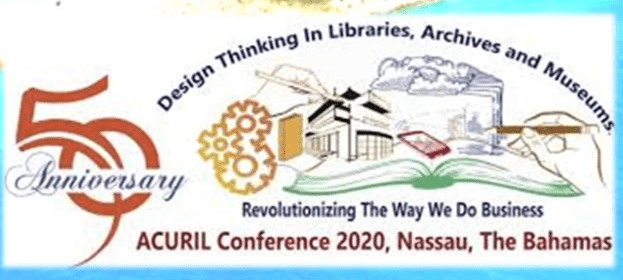
(18-19 Nov)
BIREME presents “VHL: a Caribbean integration effort” as proposal for the development of a VHL Instance for the English Caribbean, as a strategy for integrating efforts and information resources, prioritizing to facilitate the access to scientific and technical information for professionals, researchers, students and decision makers interested in, acting on, or making decisions on health area in the Caribbean region.
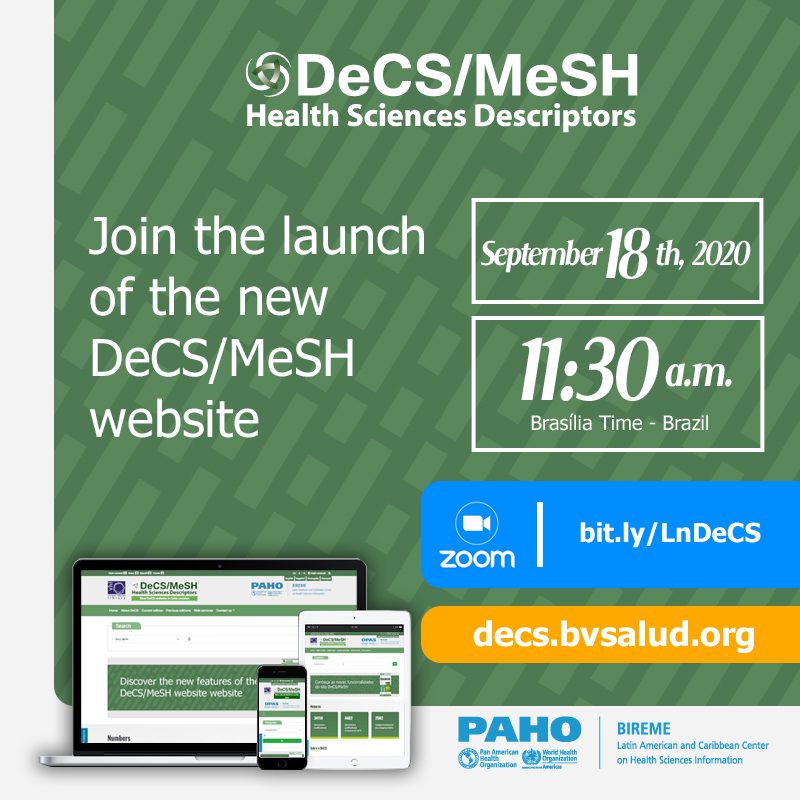
The Pan American Health Organization / World Health Organization (PAHO/WHO), through the Latin American and Caribbean Center on Health Sciences Information of the Department of Evidence and Intelligence for Action in Health (BIREME/EIH), invites you to participate virtually in the launching of the new DeCS (Health Sciences Descriptors) portal as part of the celebration of its 34 years.
DeCS is the main controlled vocabulary for indexing and retrieving published scientific and technical health literature in the LA&C region.
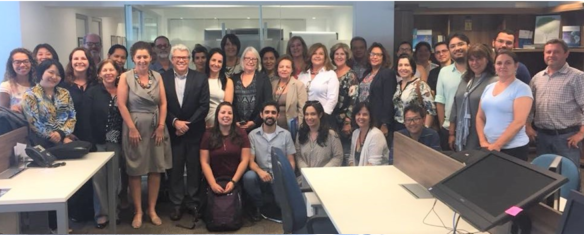
The Brazilian Network of Nursing Virtual Health Library (VHL), represented by over 30 professionals from 13 universities, as well as the Associação Brasileira de Enfermagem (ABEn – Brazilian Nursing Association), the Coordenação de Aperfeiçoamento de Pessoal de Nível Superior (CAPES – Coordination of Improvement of Higher Level Personnel) and BIREME/PAHO/WHO, met this year on May 2-4 at the premises of BIREME in order to participate of the 16th edition of the Brazil Nursing VHL Advisory Committee Meeting. The event was coordinated by the Escola de Enfermagem of Universidade Federal de Minas Gerais (EEUFMG).
 The main objective of the meeting was to define the work plan for 2018-2020, which was developed through working groups divided into the following topics:
The main objective of the meeting was to define the work plan for 2018-2020, which was developed through working groups divided into the following topics:
The consolidation and validation of the referrals of each group resulted in a plan of action up to 2020, with a distribution of responsibilities among the members of the Committee.
The Nursing VHL was born with a national approach and over the years has transformed itself into an international project, expanding the scope of its sources of information and the conformation of its committee. In the framework of this expansion, it was approved by this committee the existence of a single “Criteria for Selection and Permanence of Nursing Journals in the BDENF and LILACS databases”, as well as a single “International Committee for the Evaluation of Newspapers of the Nursing VHL”. The criteria and the composition of the committee will also be submitted for approval at the International Meeting of the Nursing VHL network, which will take place in Cuba at the end of the year.
This expansion will also be reflected on the redesign of the Nursing VHL Portal, integrating content, technology, and the retrieval of scientific and technical information published by the countries that make up the Nursing VHL network, provided they meet the selection criteria previously established.
 Below we reproduce some of the testimonies received regarding the event held in BIREME:
Below we reproduce some of the testimonies received regarding the event held in BIREME:
“The 16th Meeting of the Nursing VHL Advisory Committee, held at BIREME headquarters, represents a milestone for the initiative, not only for redirecting its paths for the next four years, but especially for creating a new environment in its development process – new actors, new institutions, new projects and new forms of sustainability. It is worth mentioning that BIREME’s participation was effective and decisive for achieving the objectives. Support for working groups was essential for the formulation of proposals and for the definition of strengthening strategies. The impact of the meeting held at BIREME can also be evaluated by the fact of being in an Institution that is highly respected in the health sciences information scenario, including the Nursing scenario in Latin America and the Caribbean. We are grateful to all the partner institutions and their representatives who, over the last 13 years, have been collaborating with the arduous task of systematizing knowledge on Nursing, which is extremely necessary to support teaching, research and practice.” Francisco Carlos Félix Lana, Escola de Enfermagem da Universidade Federal de Minas Gerais.
“The 16th Meeting of the Nursing VHL Advisory Committee was very productive. The working group dynamics proposed made it possible to evaluate different sub projects in a systematized manner, including recommendations for the improvement of one of BIREME’s successful experiences, the Nursing VHL, an important Brazilian Nursing project which has now become international. The pleasant physical space of BIREME’s headquarters, the social integration that took place during the tasty snacks and the warm welcome from the part of the BIREME team all contributed to the success of the meeting. The work was arduous, but it was facilitated by the vigor and willingness of all participants.” Regina Lima and Maria Helena Marziale, Revista Latino-Americana de Enfermagem/Escola de Enfermagem de Ribeirão Preto, USP.
“The 16th Meeting of the Nursing VHL Advisory Committee was marked by an effective progress in the development and implementation of all its projects and lines of action. I am sure that this success was due to the organization and coordination of the Meeting and the effective participation of all members of the Network and BIREME’s technical staff. In addition, the infrastructure provided by BIREME, as well as the warm welcome received from all its professionals, provided pleasant working days and demonstrated that solidarity and mutual support are essential for the work and operation of a network.” Heloniza Costa (Editor-in-chief of Revista Baiana de Enfermagem/ Universidade Federal da Bahia.
About the Nursing VHL
The Nursing VHL is a project that aims at contributing to the development of nursing, both in practice and in the academic field, promoting access to information products and services and constituting a space for equitable access to nursing knowledge, thus disseminating scientific and technical information and providing high availability and reliability of its information sources.
The VHL is coordinated by the Escola de Enfermagem da Universidade Federal de Minas Gerais and conformed by an Advisory Committee that integrates the main institutions producing scientific and technical information in nursing in Brazil. Its Advisory Committee meets once a year since 2003.
With access rates that exceed 1 million page-views per year and 95 thousand users, on average, the Nursing VHL is a reference in scientific information in the field, and it is the first search result on the Internet.
The development of the Nursing VHL is also in line with the actions of the Pan American Health Organization, which launched on May 12, 2018, in the framework of International Nursing Day, the publication “Expanding the roles of nurses in primary health care”, indicating the crucial role of nursing in expanding access to health and offering nine steps and activities to implement the role of advanced practice nurses in the countries of the Americas.
According to Dr. Diego González, Director of BIREME/PAHO/WHO, “the work we do to facilitate access to information for nursing teams helps strengthen primary health care, especially at the local level, where in many cases it is the nursing team that gives patients the first health care. BIREME will continue to support both the International Network and the national Nursing networks”.
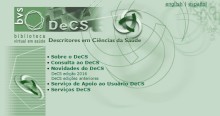
The updated version of the Health Sciences Descriptors (DeCS) was made available for consultation in April. The revision is held in consonance with the yearly revision of the US National Library of Medicine’s Medical Subject Headings (MeSH) and involves the insertion of new descriptors and the removal, modification and/or hierarchical repositioning of current descriptors. The main novelty for this version is the inclusion of terms related to PAHO’s crosscutting themes for sustainable development, which include Human Rights, Equity, Ethnicity and Gender.
BIREME has been working in association with experts on each theme in order to indentify, collect and structure the vocabulary of the terminology employed in current scientific literature on the subjects. As a result of this project, DeCS 2018 added three descriptors linked to the theme Gender, four to Equity, 19 to Human Rights and 39 to Ethnicity.
The Figure below shows the distribution of 486 new descriptors of DeCS 2018, arranged by category. Through the inclusion of the concepts of PAHO’s crosscutting issues, the Public Health category, an exclusive DeCS category, is for the first time one of the top ten categories that most received new descriptors.
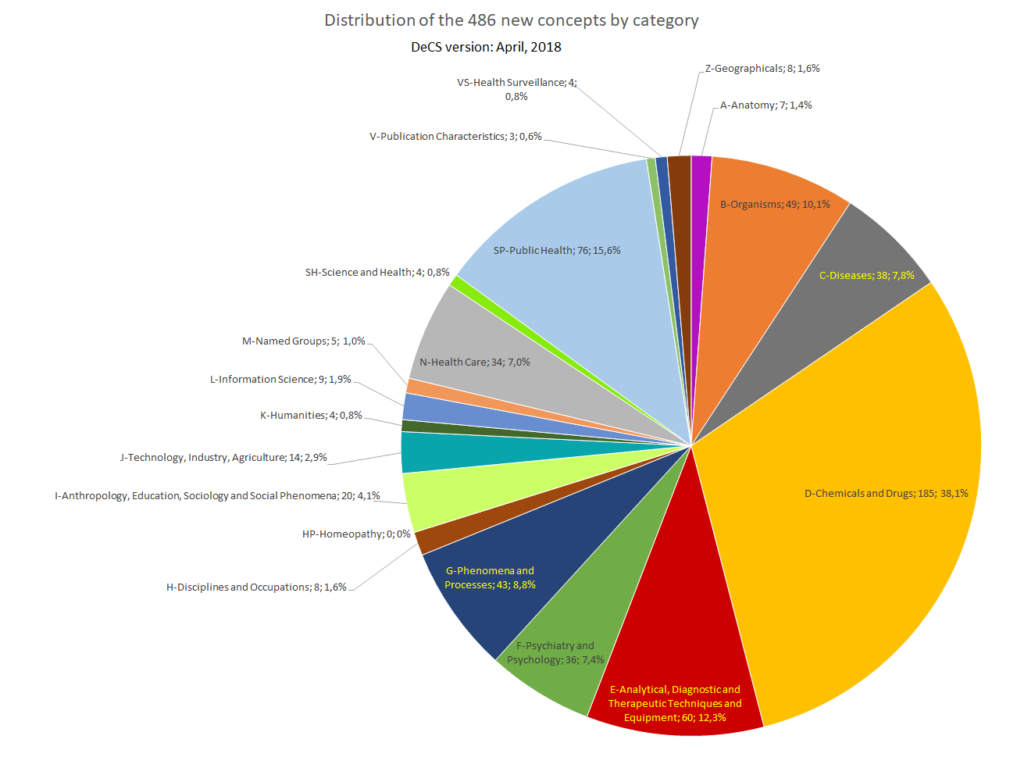 To find out more details about the new DeCS version, we recommend the DeCS 2018 edition website.
To find out more details about the new DeCS version, we recommend the DeCS 2018 edition website.
About DeCS
The structured and trilingual DeCS vocabulary was created by BIREME in order to serve as a unified language for the indexation of articles from scientific journals, books, congress annals, technical reports and other documents, as well as for use in searching and retrieving subjects of scientific literature in information sources available in the Virtual Health Library (VHL), such as LILACS, and MEDLINE, among others.
DeCS was developed based on the MeSH – Medical Subject Headings of the U.S. National Library of Medicine (NLM), with the objective of allowing the use of common terminology in searches launched in the languages of the Region, thus providing a consistent and centralized means of retrieving information regardless of language differences.
BIREME is responsible for the Portuguese translation of descriptors, their synonyms, their reach notes and indexation, as well as for the revision of the Spanish translation, elaborated in cooperation with the Facultad de Medicina de la Universidad de Chile – for regional Spanish and the Biblioteca Nacional de Ciencias de la Salud of the Instituto de Salud Carlos III – for Spanish from Spain. BIREME also implements the hierarchical modifications implanted by the MeSH, as well as adjustments in terminology exclusive to DeCS. These activities are carried out throughout the year and constitute the yearly update of DeCS.
DeCS integrates the LILACS methodology, the VHL, and participates in the development of a unified terminology and semantic network in health, the UMLS – Unified Medical Language System of the NLM, holding the responsibility of updating the terms in Portuguese and Spanish.
Besides the MeSH original medical terms, BIREME developed the specific areas of Public Health, Homeopathy, Science and Health and Sanitary Surveillance.
The concepts that make up the DeCS are organized in a hierarchic structure, allowing for searches in broader or more specific terms, as well as all the terms belonging to a same hierarchical structure.
Links of interest
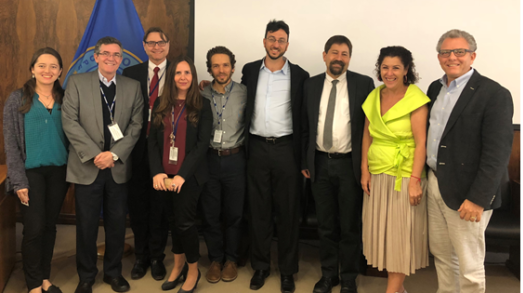
The VHL TCIM Americas was launched on March 12 by the Director of PAHO/WHO and the Director of BIREME, within the framework of the 1stInternational Congress of Integrative, Complementary and Public Health, organized by the Ministry of Health of Brazil, in Rio de Janeiro. Recently, this VHL was presented and promoted by BIREME/PAHO/WHO in two important events held in the United States, thanks to the initiative coordinated by the Health Services and Access Unit, and the Office of Equity, Gender and Cultural Diversity of PAHO/WHO.
The first event was the Webinar “Traditional and Complementary Medicine in Primary Health Care: 40 years after Alma-Ata”, held on May 8, 2018, with the purpose of examining the role of Traditional and Complementary Medicines in the APS, in the context of the 40th anniversary of the Alma-Ata Declaration, the Strategy of Universal Health Care and the WHO Traditional Medicine Strategy 2014-2023.
 Dr. Anna Coates, head of the Office of Equity, Gender and Cultural Diversity of PAHO/WHO, who made the opening speech, remarked that “the strengthening of efforts to recognize ancestral knowledge and traditional and complementary medicine is key to combating ethnic inequities and thus being able to move towards Universal Health. Referring to the VHL TCIM Americas, she noted that “improving access to knowledge and experience in traditional medicine is part of these long-awaited efforts to move towards inclusion and equity”. This is why Traditional and Complementary Medicine was included as a central component of the intercultural approach in the PAHO/WHO Ethnicity and Health Policy, that seeks to guarantee the inclusion of indigenous peoples, afro-descendants, Romani people and members of other ethnic groups, and urges Member Stated to consider the connection between ethnicity and health, and to promote an intercultural approach for advancing towards Universal Health. Likewise, the Universal Health Strategy of PAHO recognized that challenges such as respect for traditional medicine affect the quality of health care.
Dr. Anna Coates, head of the Office of Equity, Gender and Cultural Diversity of PAHO/WHO, who made the opening speech, remarked that “the strengthening of efforts to recognize ancestral knowledge and traditional and complementary medicine is key to combating ethnic inequities and thus being able to move towards Universal Health. Referring to the VHL TCIM Americas, she noted that “improving access to knowledge and experience in traditional medicine is part of these long-awaited efforts to move towards inclusion and equity”. This is why Traditional and Complementary Medicine was included as a central component of the intercultural approach in the PAHO/WHO Ethnicity and Health Policy, that seeks to guarantee the inclusion of indigenous peoples, afro-descendants, Romani people and members of other ethnic groups, and urges Member Stated to consider the connection between ethnicity and health, and to promote an intercultural approach for advancing towards Universal Health. Likewise, the Universal Health Strategy of PAHO recognized that challenges such as respect for traditional medicine affect the quality of health care.
The VHL TCIM Americas was developed with the aim of contributing to this purpose. Dr. Diego González, Director of BIREME/PAHO/WHO and Verônica Abdala, Manager of Products and Information Services of BIREME presented VHL Americas at the event. This VHL is a virtual space that draws on the work of the TCIM Network for the Americas, which seeks to expand and facilitate access to knowledge and to increase and improve the quality of research in the area, fundamental axes for advancing towards Universal Health and the inclusion of all peoples.
 Three other presentations completed the agenda of the Webinar: “The role of integrative and complementary practices in Primary Health Care in Brazil”, by Daniel Miele Amado, National Coordinator of Integrative and Complementary Health Practices, Ministry of Health of Brazil; “The importance of Traditional Medicine for ethnic diversity in the Americas”, by Dr. Vivian Camacho Hinojosa, member of the High Level Commission 40 years of Alma-Ata, PAHO; and “Competences in integrative health for professionals in Primary Health Care”, by Dr. Benjamin Kliegler, National Director of the Comprehensive Health Coordination Center, Office of Patient-Centered Care and Cultural Transformation of the US Veterans’ Health Administration. The moderator for the Webinar was Dr. Hernán Luque, Advisor, PAHO/WHO Health Services and Access Unit.
Three other presentations completed the agenda of the Webinar: “The role of integrative and complementary practices in Primary Health Care in Brazil”, by Daniel Miele Amado, National Coordinator of Integrative and Complementary Health Practices, Ministry of Health of Brazil; “The importance of Traditional Medicine for ethnic diversity in the Americas”, by Dr. Vivian Camacho Hinojosa, member of the High Level Commission 40 years of Alma-Ata, PAHO; and “Competences in integrative health for professionals in Primary Health Care”, by Dr. Benjamin Kliegler, National Director of the Comprehensive Health Coordination Center, Office of Patient-Centered Care and Cultural Transformation of the US Veterans’ Health Administration. The moderator for the Webinar was Dr. Hernán Luque, Advisor, PAHO/WHO Health Services and Access Unit.
The second event was the International Congress on Integrative Medicine & Health, held in Baltimore, from May 8 to 11, and organized by the Academic Consortium of Medicine and Integrative Health of the United States. The Congress brought together approximately one thousand participants from 30 countries, mainly researchers and professionals of diverse profiles interested in research in this area.
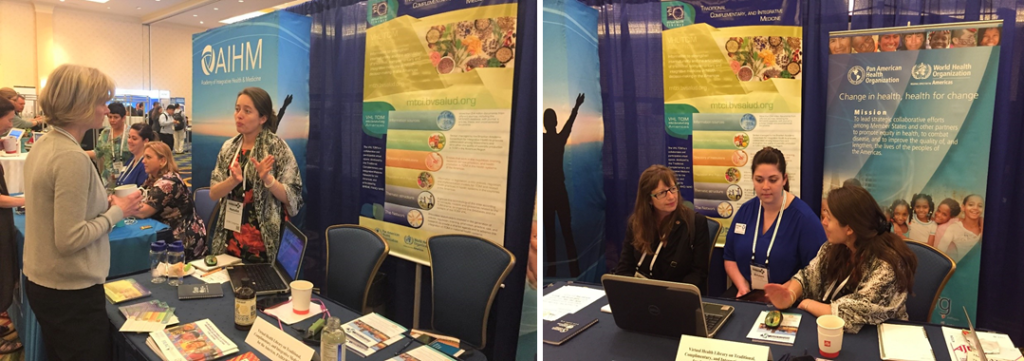 The mandates, conceptual frameworks and initiatives of PAHO/WHO on the subject, including the VHL TCIM, were presented in a Panel of the Congress by Daniel Gallego, consultant of the Health Services and Access Unit (HSS/HS/PAHO). Ricardo Ghelman, President of the Brazilian Academic Consortium on Integrative Medicine and Daniel Miele Amado, from the Ministry of Health of Brazil, both strategic partners of the VHL TCIM, presented their respective institutional initiatives and their articulation with the VHL TCIM. Likewise, thanks to the support of HSS/HS/PAHO, the VHL TCIM was promoted and demonstrated in a stand in the exhibition hall throughout the event, where Verônica Abdala (BIREME/PAHO/WHO) and Natalia Sofía Aldana (Consultant of the VHL TCIM project) had the opportunity to explore new collaborations.
The mandates, conceptual frameworks and initiatives of PAHO/WHO on the subject, including the VHL TCIM, were presented in a Panel of the Congress by Daniel Gallego, consultant of the Health Services and Access Unit (HSS/HS/PAHO). Ricardo Ghelman, President of the Brazilian Academic Consortium on Integrative Medicine and Daniel Miele Amado, from the Ministry of Health of Brazil, both strategic partners of the VHL TCIM, presented their respective institutional initiatives and their articulation with the VHL TCIM. Likewise, thanks to the support of HSS/HS/PAHO, the VHL TCIM was promoted and demonstrated in a stand in the exhibition hall throughout the event, where Verônica Abdala (BIREME/PAHO/WHO) and Natalia Sofía Aldana (Consultant of the VHL TCIM project) had the opportunity to explore new collaborations.
Both events confirmed the importance of the VHL TCIM Americas and of the work that is being developed with the collaboration of BIREME/PAHO/WHO and the support of the technical units of PAHO/WHO. Participants of the events highlighted the results of the collaborative work, articulated in the short period of time that the project has been underway.
According to Verônica Abdala, Manager of Services and Information Sources of BIREME/PAHO/WHO, “we have come a long way, but there is still a lot to do. The VHL TCIM has ambitious plans for expansion and development of its various sections and services, including the promotion of the quality of research on the subject, especially in Latin America and the Caribbean, as well as the development of new content such as information for self-care and synthesis of evidence in TCIM. These are ambitious objectives, which require financial resources, expansion of collaboration and strengthening of the Network”.
Links of interest
Watch the video on the TCIM VHL: https://youtu.be/mCtaqrCzEu0
Visit the TCIM Americas VHL: http://mtci.bvsalud.org/